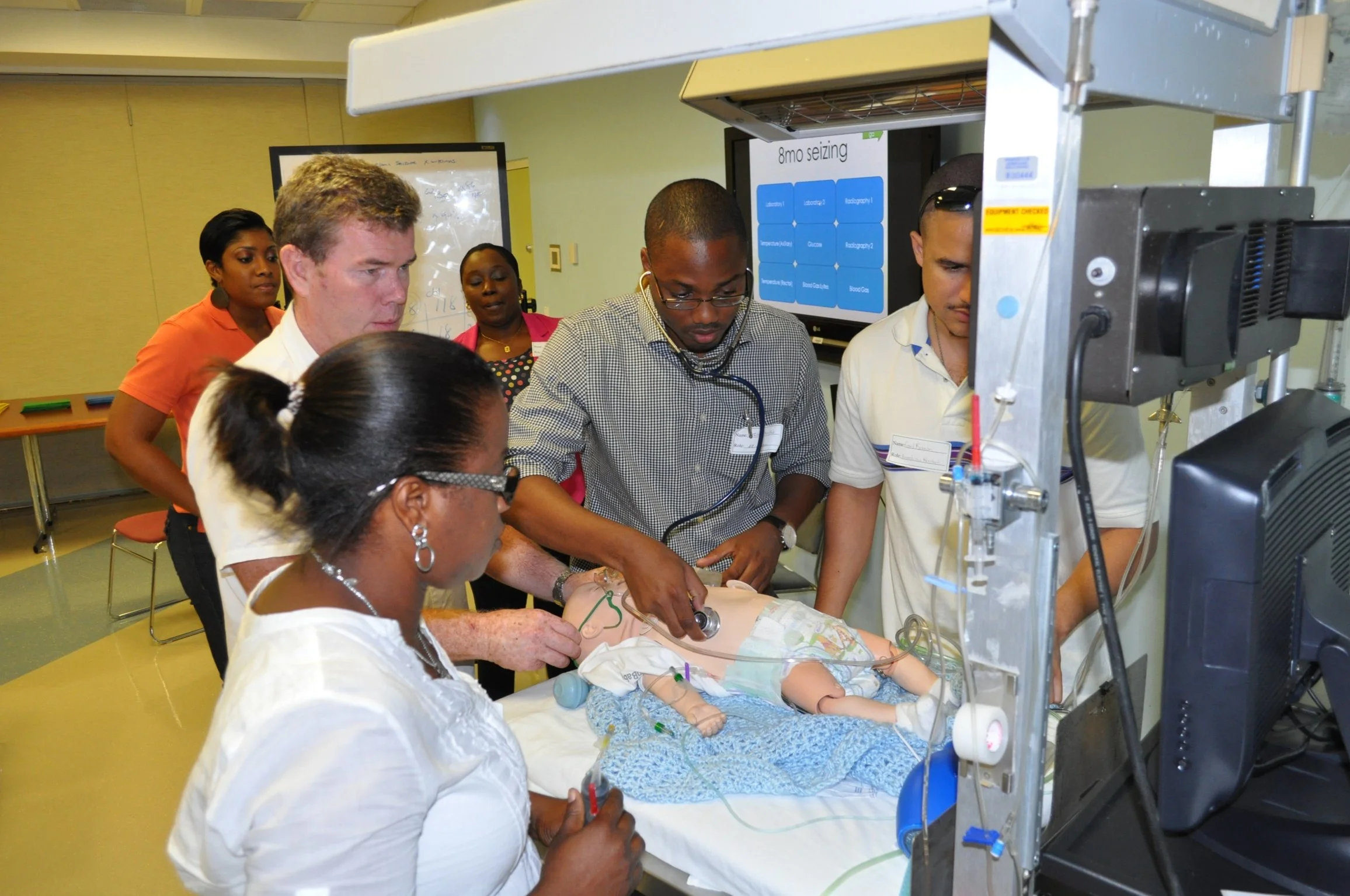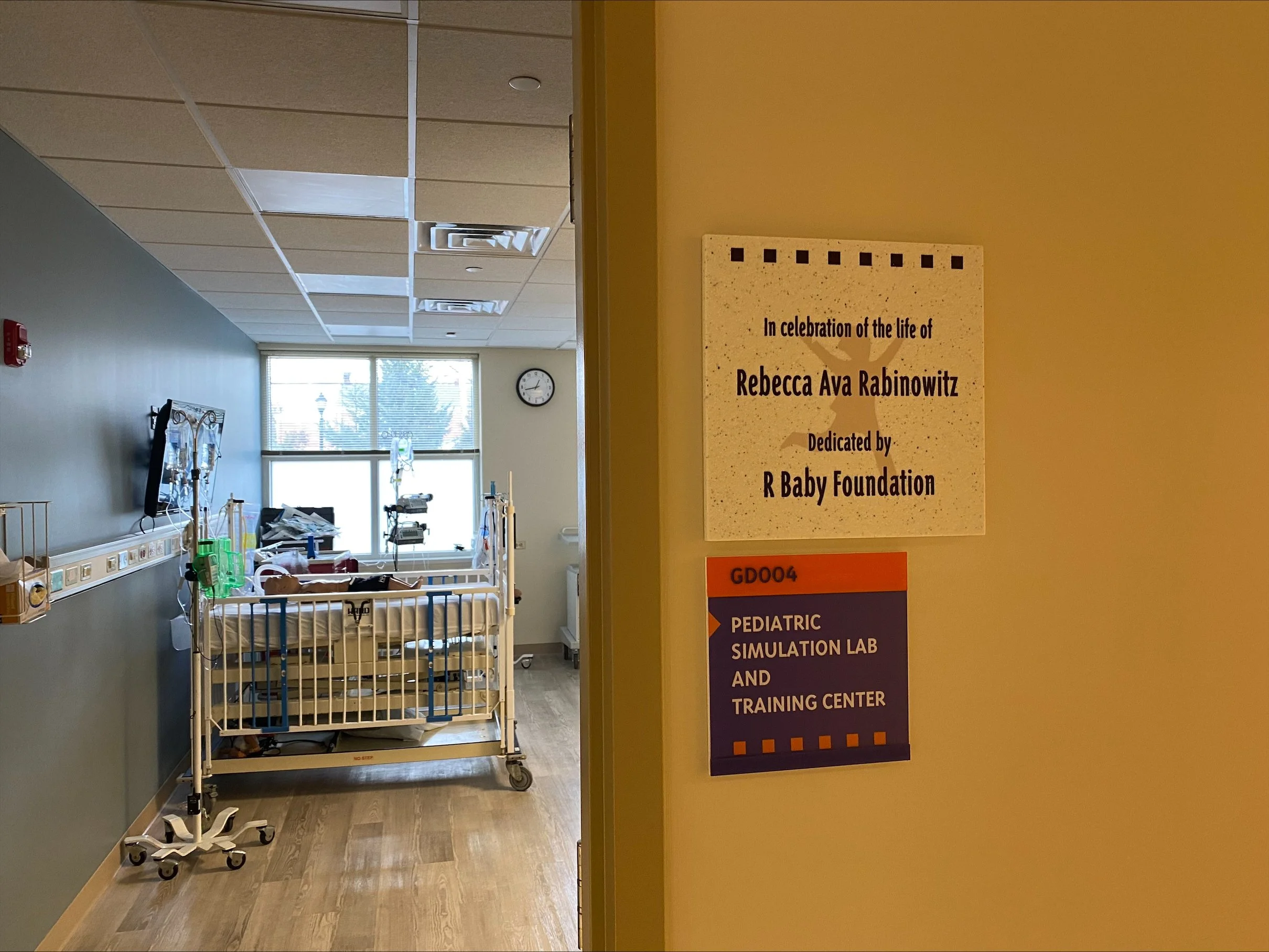
Our Lifesaving Grants
1 million children benefited annually…and counting.
Funding and empowering innovative research and programs is at the center of R Baby’s mission and successful results. We support and partner with the leading pediatric specialists, hospitals and emergency departments. From training and physician resources to education and research, our grants are saving lives.
R Baby Foundation was born in 2006 to fill a unique need—helping save babies’ lives by organizing and funding efforts to improve the outcomes of emergency medical care. From our initial focus on helping newborn babies with often misdiagnosed viral infections and other infectious diseases, we have expanded our mission to help raise the standards of emergency pediatric care for all infants and children, supporting education, research, treatment, training and life-saving equipment. Our grants impact hospitals throughout the United States and beyond its borders and improve the care of over 1 million babies and children each year.
As R Baby keeps growing and expanding, we continue to fund successful, proven programs that can be disseminated widely, as well as supporting research that advances pediatric emergency care.
Grants are reviewed on a rolling basis by invitation. To learn more email us at info@rbabyfoundation.org.
Granting Goals
Expand the network of children’s hospitals that collaborate with community hospitals in order to assess, train and improve quality and safety.
Support the expansion of tele-medicine to provide open lines of communication between children’s hospitals, pediatric specialists and other ERs.
Make sure every ER and hospital is prepared to stabilize and transport or diagnose and treat a child in an emergency.
Facilitate dissemination of the latest pediatric infectious disease knowledge to any medical professional that cares for children.
Provide parents with additional education and tools to advocate for their child in an emergency situation.
Training
Emergency room doctors spend only 16 percent of their training time learning how to recognize and respond to pediatric emergencies — yet up to 33 percent of their patients are babies and children.
That’s why R Baby partners with leading medical schools and hospitals to fund programs that bring essential training directly to physicians and ER staff, from life-like emergency simulations to education modules, vital signs awareness and other innovative programs.
Simulation Training Grants
R Baby funds training to enhance pediatric emergency preparedness, particularly in community ERs where most children are treated.
-
Provides pediatric simulation-based assessment and training to community ERs, assessing equipment and supplies, followed by targeted training and post-training evaluations.
Has trained thousands of providers (nurses, doctors) at hundreds of ERs nationwide.
Resulted in dozens of peer-reviewed publications and an expanded ImPACTS website.
Enhanced interventions include increased interactions between children’s and community hospitals, specific resource guidance, and ongoing simulation-based training.
Improves provider confidence, better equipment availability, and sustained relationships for long-term education.
-
Provides high-fidelity mannequin-based training in three Maryland community hospitals lacking pediatric emergency specialists.
Following training, 99% of surveyed staff reported increased comfort with pediatric patients, 96% noted improved ER preparedness, and 100% valued in-situ simulation.
Led to system improvements, such as new defibrillators, expanded dosing manuals, and formalized protocols for pediatric emergencies.
-
Delivers resuscitation education and training to eight rural hospitals in Mississippi, including hands-on simulation and leave-behind kits with pediatric resuscitation supplies.
Trained hundreds of healthcare professionals, improving care for ~70 pediatric/neonatal patients transported monthly.
Pre- and post-training evaluations showed improved knowledge (e.g., managing pediatric trauma/shock emergencies rose from 2.78 to 4.13 on a self-evaluation scale).
Established trusted relationships between trainers and rural hospitals, with plans to expand to obstetrical emergency training.
-
Provides training for EMTs, paramedics, and nurses using realistic scenarios.
Enhances statewide pediatric emergency care for first responders.
-
Provided pre-hospital care and transport quality for ~9,000 pediatric patients annually.
Training was shared nationally to improve pediatric emergency care.
Education
Educating parents is a key focus for R Baby Foundation to help provide the information and tools to empower them to advocate for their children during an emergency.
-
Implements a patient- and family-centered care program with best practices for communication. Includes the “Difficult Dialogues” video series to improve doctor-parent communication.
The program was expanded to include webinars and integration into medical school curricula.
-
R Baby Foundation works directly with parents to help them prepare for emergencies, navigate emergency rooms, and advocate for their children. It focuses on underserved communities.
Through a partnership with Baby Buggy Foundation and Mt. Sinai Hospital, parents received training to prepare for handling an emergency with their child.
Physician Resources
R Baby provides tools and resources to ensure physicians are equipped for pediatric emergencies.
-
Sponsored by R Baby since its inception as POISE, this collaborative medical education research network develops and shares novel educational training modules, webinars and other resources that result in measurable improvements in the health outcomes of acutely ill infants and children.
INSPIRE has 612 community members at 124 sites in 36 countries.
Developed lifesaving training modules, including intubation and diagnosis recognition.
Reaches over 500,000 front-line healthcare providers, with 14,000 intubation iPad app downloads and 22,000 online video downloads for lumbar puncture training.
Projects include virtual simulation curricula for neonatal resuscitation, augmented reality coaching for CPR, and seizure management training.
Secured over $12M in additional funding beyond R Baby’s support.
In 2024, R Baby Foundation presented the first R Baby- INSPIRE Award for Advancing Pediatric Emergency Medical Care.
This award provides a funding opportunity to support groundbreaking investigators in simulation- based research for pediatric emergencies.
-
Trains thousands of doctors with statistically validated improvements in managing pediatric fever and respiratory conditions.
Enhances diagnostic accuracy and treatment protocols.
-
Attracted over 400 emergency physicians annually, featuring top pediatric experts and made available globally via webinar.
Shared cutting-edge information on pediatric infectious diseases.
Research
R Baby Foundation funds innovative research to advance pediatric emergency care.
-
Rapid viral detection technology identifies up to 100 infections in a single sample, running over 3,000 tests annually.
Reduced diagnosis time from two weeks to under 12 hours, enabling life-saving interventions. This innovative lab serves as a model for viral testing nationwide.
-
The Riley fund focuses on predicting and preventing stillbirths, particularly those caused by umbilical cord abnormalities.
Found 19% of stillbirths in a large U.S. cohort were due to umbilical cord issues, published in a leading journal.
Studied a biomarker (DLK1) for placental insufficiency, with ongoing research into ultrasound-based risk assessment for cord accidents.
Aims to develop tools for identifying stillbirth risks in late pregnancy (34–38 weeks) to guide early delivery decisions.
-
With support from R Baby Foundation, Goryeb is a key leader in the Improving Pediatric Sepsis Outcomes (IPSO) collaborative with a goal to reduce sepsis mortality by 75%.
Reduced time from sepsis recognition to IV antibiotic administration from 154 to 113 minutes and antibiotic duration from 18 to 9 days.
Improved three of five key IPSO processes (sepsis trigger activation, huddle activation, order set utilization).
-
Pioneering viral infection research using transgenic mice to study interferons as potential early-stage virus treatments.
The study aimsed to revolutionize virus identification and treatment in newborns.
Technological Innovations
R Baby Foundation funds innovative tools to help parents and the medical community improve outcomes for children in an emergency.
-
This mobile app helps parents find the closest ER best equipped for pediatric care, based on surveys of over 5,000 U.S. ERs.
Downloaded over 68,000 times, with proven life-saving impact.
Resulted in 20 published manuscripts and multiple national conference presentations.
Supports telemedicine and pediatric care coordination research.
-
Funding from R Baby Foundation enabled rapid production of PPE and innovative prototypes like intubation protection boxes.
Donated 3D printers to Columbia University for producing 100–200 face masks daily.
Donated a neonatal ventilator to Morristown Medical Center, impacting ~25 neonates and 30 adult patients.





